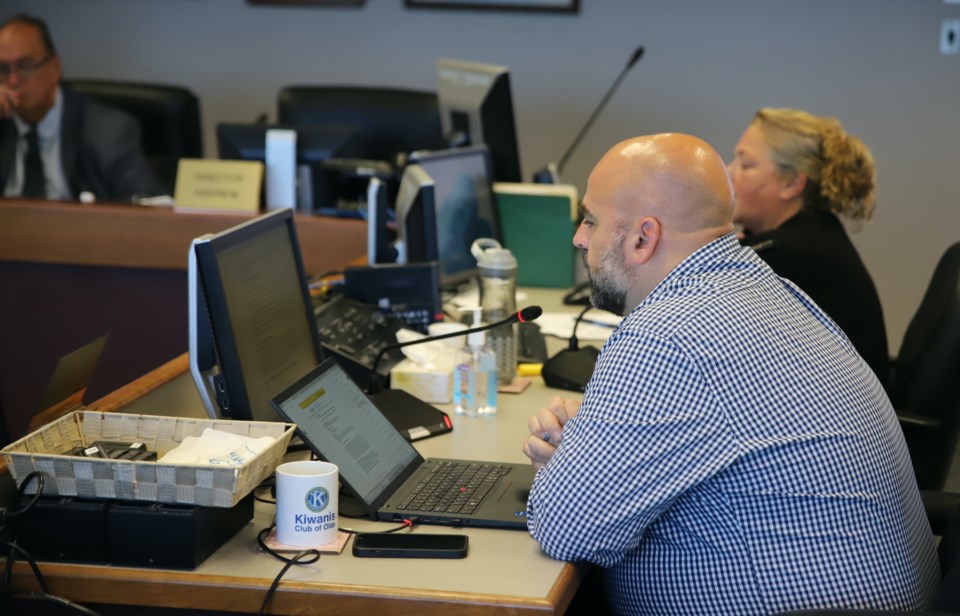OLDS — A new revised winter road maintenance policy is now in place in Olds.
Council gave it the thumbs-up during its Nov. 12 meeting.
The policy includes a route for trails as well as higher activation levels across all trail routes.
“Building on 2023 improvements, such as opening a snow dump near Uptowne and equipping both loader and skid steer with new blades, administration is confident that the upcoming snow season will be managed more efficiently,” a town document says.
The policy says the Town of Olds “shall remove snow accumulation as efficiently as possible, subject to any limitations or factors out of the control of the Town.”
It says plowing and snow removal priorities are “primarily based on traffic volumes. However, consideration is also given to level of service and access to key community buildings.”
Uptowne
One major focus is the Uptowne core.
The first priority there is to open driving lanes.
“The town will plow snow to both sides of the streets, except where it is more practical to plow to one side continually,” the policy says.
“In the event of several snowfalls that accumulate an excessive amount of snow, the director of infrastructure (Adrian Pedro) or designate will have the discretion to utilize any town-owned piece of land for plowed snow storage as deemed necessary to keep roads open.”
Parking lots will be plowed and sanded in conjunction with the priority routes.
Parking lots will not be plowed or sanded on weekends or statutory holidays, except in the case of the Protective Services building.
Snow will be removed when 10 centimetres or more has fallen within 24 hours and clearance of that snow will begin within 24 hours after the snowstorm has ended.
Work will not occur while the snow is falling unless Pedro or his designate deems that to be necessary.
The snow will be removed when traffic interference is at its lowest (usually between 10 p.m. and 8 a.m.).
Where possible, that snow will be moved to the centre of the street in windrows and removed before the next business day.
The goal is to complete snow removal in Uptowne within 48 hours of the onset of snowfall.
However, the policy says “longer timelines may occur due to heavier precipitation, equipment functionality, or operator availability.”
Emergency and extreme conditions are defined as occurring when “a minimum of 15 centimetres of snowfall has fallen within 24 hours, it continues to snow heavily with a forecast predicting more snow, removal is not practical nor feasible and the requirements exceed the Town’s capacity and available equipment.”
Driving lanes will be opened by grading to the sides.
Snow removal will begin within 48 hours of the snowstorm ending.
Waste collection may be suspended until equipment is available to clear streets and lanes.
Once equipment is available, streets and lanes will be plowed according to the waste collection schedule and to make lanes passable.
Residential areas
According to policy, the first priority in residential areas is to open driving lanes.
The town will plow snow to both sides of streets, except where it is more practical to plow to the same side continually.
If several snowfalls occur, resulting in an “excessive amount of snow,” Pedro or his designate “will have the discretion to utilize any area in Town deemed necessary to keep roads open,” the policy says.
The second priority when clearing snow in residential areas is to “plow snow on those streets where snow can be easily accumulated without unduly interfering with the travelling public,” the policy says.
Examples cited are municipal reserves, parks, vacant lots, and boulevards with setback sidewalks.
“Just for clarification for our viewers that could be listening, so with policy 502C winter road maintenance, we will still be doing road maintenance, but we have just changed the level on which we will react to it, correct,” Wanda Blatz asked.
“That’s correct,” Pedro replied.
“OK, thank you,” Blatz said, “because there’s been some social media that states you’re no longer going to do snow removal and I just think that people need to be aware that we will continue to do so, but there will be different standards.”



